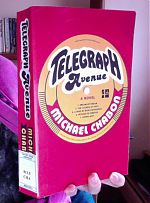
Michael Chabon
Telegraph Avenue
I don’t know if there’s a book I’ve read lately that was as fun as this one. Michael Chabon certainly has literary snazz—his vocab and snappy metaphors and equally ludicrous and believable plot are rolled together like the pieces of some base-thumping car driving down Telegraph Ave. Certainly this book piqued me more for having lived in just the area of Oakland (near Berkeley) where it is set. I lived a year and a half on Shattuck Avenue, which runs parallel to Telegraph, in a large rambling co-op.
That part of town is a strange place. A kind of no-man’s land between Berkeley, with its organic-raw-food-of-the-people and hyper-social-justice vibe, and Oakland, which is much more difficult to describe because it is so much more varied. Michael Chabon plays with these difficulties: one couple is black, the other white. The men and women of each pair are friends and business partners; the women midwives, the men own a small vintage record shop. Archy’s deadbeat father was once a blaxploitation star, and Chabon describes the four main characters by their cars (Saab, Volvo, and El Camino). There are also leisure suits, a singing parrot, a zeppelin, the Berkeley Bowl, and plenty of music references.
But most of all, what kept me energized while reading during those long flights over the Atlantic, was Chabon’s mesmerizing style and language. His metaphors should be framed. Here are a just couple (unfortunately I couldn’t find the one that snapped at me at the beginning):
Walter had his eyes closed, holding himself like a plateful of water…
Archy felt blood in his cheeks, the shame of the wonderer in a world that urged decision. A deliberator nipped at and harried by the hounds of haste.
The main message of this book is one of birth and rebirth, about being able to start again. And not just for Archy, who goes through most of the trials, but almost every one of the main characters in the book goes through a transformation that leaves their lives different from the beginning to the end. Even though this involves a fair amount of struggles and unpleasantness, when I reached the end of the book I was left with a sweet feeling of hopefulness and with the best of humanity.
· · · · · · · · · · · · · · · · · · · ·